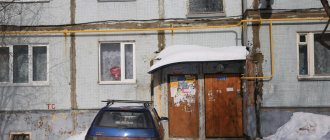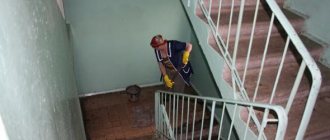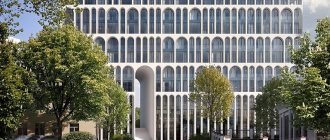An instructive story that to reconstruct premises in an apartment building, it is better to obtain the consent of 100% of the owners.
Today we will tell you how the Supreme Court resolved a dispute about the use of common property in an apartment building between the owners and an entrepreneur
Violation of the rules for the use of common property of the apartment building
170991
How it all started
An entrepreneur bought an apartment in an apartment building and decided to convert it into a hairdressing salon. To do this, he applied to the administration for permission and received 75% of the votes for creating an entrance group at the general meeting of owners.
But ⅔ of the votes were not enough. One owner opposed the creation of a hairdressing salon and demanded that everything be returned to its original form. The entrepreneur refused because he had the permission of the administration and the consent of the majority of the owners. The owner went to court.
The district court supported the requirement to demolish the entrance structure: it declared the construction permit invalid and ordered the entrepreneur to demolish the extension.
The entrepreneur challenged the district court's decision in the regional court and won. The owner did not stop there and appealed to the Supreme Court.
The need to determine the composition of the common property of premises owners in apartment buildings
5060610
Where to contact
If the owner considers the repair of his residential premises impossible, and its condition is emergency, it is necessary to submit an application to the executive bodies of local government.
Often these are housing or fire inspections, or similar structures. You can address the application to the local administration, and from there it will be forwarded to the place of execution.
After submitting the application, an interdepartmental commission is created, which makes an appropriate decision within a month. The applicant is notified of the results of the work within five days after the decision is made.
The following documents are attached to the application:
- Title documents for the house or their copies certified by a notary;
- Technical passport and floor plan;
- Cadastral number and papers on land privatization;
- Certificate of an independent examination, if any.
If an accident report is received, the owner has three options:
- Receiving material compensation - calculations are based on average market prices per square meter;
- Relocation to a new apartment at municipal expense;
- Purchasing larger housing with an additional payment for excess square meters.
Since land plots are usually small, many owners often choose compensation. In this case, money from the budget is transferred to the owner’s account within a month.
What the Supreme Court decided
The Supreme Court of the Russian Federation sided with the owner. He indicated that the entrepreneur and the city administration were guided by Art. 36 of the Housing Code of the Russian Federation, which states that the general meeting of owners can resolve issues related to:
- reconstruction of the apartment building,
- construction of extensions,
- provision of land for use.
According to paragraph 1 of Art. 46 of the Housing Code of the Russian Federation, for this it is necessary to obtain the support of two-thirds of the total number of votes of the owners of premises in the apartment building.
The Supreme Court of the Russian Federation said that this was wrong. Because an extension for a hairdresser appeared on the land plot of an apartment building, which is part of the common property.
The owners of the premises own the common property of apartment buildings on the right of common shared ownership. The entrepreneur reduced the disputed land plot by adding an extension. Reducing the common property of an apartment building is possible only with the permission of 100% of the owners of this house. Even if one owner does not agree with the extension of the entrance structure, it cannot be built.
The Supreme Court of the Russian Federation declared the construction of the extension illegal despite the fact that the permit was issued by the city administration. The regional court, where the entrepreneur filed an appeal, and the city administration were wrong because they incorrectly applied the law.
The RF Supreme Court ordered the regional court to consider the case anew. This has already been done and now the entrepreneur must demolish the extension.
Land plot as part of the common property of the MKD
1184582
Continuous resettlement
Houses with more than 70% wear and tear, which are not considered unsafe, can be included in regional capital repair programs, or rather, in three-year subprograms. Only necessary work will be carried out in these buildings to maintain them in a safe condition for residents until the houses are transferred to the emergency fund. As the press service of the Ministry of Construction told Izvestia, the subprogram will be paid for, like major repairs, at the expense of citizens. By decision of local authorities, co-financing from the regional and municipal budgets is possible, the department added. The development of a subprogram is provided for by the new bill on the resettlement of emergency housing. Its provisions are currently being discussed at various venues.
Photo: RIA Novosti/Mikhail Voskresensky
President Vladimir Putin, in his May decree, set the government the task of sustainable reduction of the emergency fund. As well as searching for continuously operating tools for relocating citizens from uninhabitable houses.
Native ashes: how to live where you can’t live
Emergency doctors think they have the wrong address when they see one of the residential buildings in Omsk
In 2019-2024, it is planned to resettle 530 thousand people from 9.54 million square meters. m of emergency houses. It is planned to spend more than 507 billion rubles on this, of which 431 billion will come from the federal budget. In total, according to the results of the third quarter of 2021, there are 54.7 thousand emergency houses in Russia with a total area of 16 million square meters. m, reported the Ministry of Construction.
According to the Fund for Assistance to Housing and Communal Sector Reform, over 9 months of this year, 2.28 million square meters were recognized as emergency. m of housing. Most of these houses are located in the Republic of Sakha (Yakutia), Kemerovo and Arkhangelsk regions, Perm Territory, Khanty-Mansiysk Autonomous Okrug.
In October, the government introduced a bill to the State Duma establishing new mechanisms for relocating emergency housing. In addition to the subprogram for houses with a high degree of wear and tear, new additions include specifying the criteria and procedure for recognizing buildings as unsafe and giving regional authorities the right to establish additional support measures for displaced people.
Photo: RIA Novosti/Valery Melnikov
At the same time, the very concept of “dilapidated housing” was excluded from the bill developed by the Ministry of Construction. As Deputy Prime Minister Vitaly Mutko explained, it was decided not to multiply legal concepts - that is, not to separate dilapidated and dilapidated housing, especially since it is difficult to establish criteria for the first.
Residential containers: why in the north of Russia people live in barrels for decades
In the regions they say that it is difficult to get rid of the legacy of the past because there is no legal basis for this. But the residents themselves do not always want to move
What to do if the administration made a mistake
Permission for reconstruction is a complex and important issue. It is understood that the city administration has complete information about when and in what case to issue it. But the administration sometimes makes mistakes.
If it turns out that a reconstruction permit was issued illegally, the victim has the right to recover construction and demolition costs through the court. The city administration will pay for them from its budget (Article 1069 of the Civil Code of the Russian Federation).
In our case, the entrepreneur has a chance to receive compensation from the city administration. But the claim has not yet been registered in the courts.
The house is collapsing, bills are coming: how can residents of dilapidated houses avoid paying for major repairs?
The floors are collapsing, there are no floor slabs, pipes are leaking: the residents of the house on Internatsionalnaya Street in Beslan are seriously afraid for their lives.
“The floors were replaced - the boards were rotten. Cracks appeared on the walls,” said a local resident.
The house was declared unsafe back in 2015, and there can be no talk of any major repairs. However, the bills say the opposite. Residents still receive receipts with invoices for major repairs with enviable regularity to this day.
Thousands of residents of houses that are about to become a pile of sand and dust face a similar problem in our country. At the same time, the law clearly states: if a house is officially recognized as unsafe, then its residents are not obliged to pay for major repairs. So the residents of this house have a direct route to court - to demand a review and return of payments.
If the house is recognized as dilapidated and not in disrepair, residents are required to pay for major repairs. However, they also have the right to demand that their housing be transferred to emergency status - criteria for this have been developed.
“If a house is worn out by more than 70 percent, it is considered to pose a threat to the life and health of the citizens who live in it. And, naturally, an inspection procedure should be launched with the involvement of an interdepartmental commission that operates in the municipality,” said Sergei Sokhranov, executive director of the NP Housing and Communal Services Control.
This is where the problems begin. Such recognition is not beneficial for local authorities, and not only financially: often there is simply nowhere to move people from dilapidated housing.
“The municipality must put a burden on itself: as soon as a house is recognized as unsafe, it is given a period (and it is quite short) to relocate or provide new housing. But, as a rule, the municipality does not have a maneuverable fund or it is in the same disrepair. But in order to build a house, it takes time,” says ONF expert Yulia Belekhova.
Some houses simply don’t have time anymore. In house number 16 on Pribaltiyskaya Street in Volgograd, the walls have long been bursting at the seams, but local authorities are in no hurry to recognize the dilapidated building as unsafe.
"That's horrible! Bricks are falling out of the foundation, my ceiling has collapsed, and I regularly pay for major repairs,” complains local resident Anna Yarikova.
It seems that as long as the scheme for recognizing dilapidated houses as unsafe will remain in the hands of local authorities, the problems of thousands of residents of dilapidated houses will remain regular. Existing laws, social activists say, of course, should protect the rights of owners of such housing, but in practice this does not happen everywhere.
“All the mechanisms are there. The issue is not the absence of a law, but the law enforcement practice in the implementation of legislation. Today’s situation forces us to make a decision to make life easier for those who live in dilapidated housing, at least by canceling fees for major repairs for them,” said Artem Kiryanov, a member of the Public Chamber of the Russian Federation.
Such a cancellation of contributions to the capital repair fund, on the one hand, would help people save money. And local officials were deprived of the basis for deciding whether to recognize the house as unsafe or not.
conclusions
Disputes related to the use of common property in apartment buildings are complex and eternal. Therefore, it is important to know how the Supreme Court of the Russian Federation decides them. To prevent a situation like the one in today’s example in your home, follow these simple rules:
- Study the full composition of common property in the MKD (Article 36 of the Housing Code of the Russian Federation).
- Receive 100% of the votes at the OSS if the reconstruction entails a decrease in the total property of the apartment building.
- Get permission from your local administration.
- If the court challenges the administration's decision, demand compensation.
You can apply these tips in the opposite situation - when you need to rein in an entrepreneur who has illegally built an extension on the property. In this case, check the OSS protocols and request permission from the administration.
It is much easier to hold a general meeting of owners and resolve the issue of reconstruction using the “OSS 100%” service.
Building assessment
The legislation is applicable in housing conditions that do not meet sanitary standards, safety regulations, and also threaten health and life. The criteria for assessing accident rates are given in Decree of the Government of the Russian Federation No. 47:
- Dangerous location of the house - an area with a high probability of landslides, avalanches, floods, flooding;
- Man-made danger – being near objects of man-made danger and accidents;
- Communication hazard - placing housing too close to power lines;
- Geological factors - destruction or damage to a house as a result of storms, earthquakes, blizzards, with the impossibility of its restoration;
- Being near highways means exceeding noise standards by more than 55 decibels;
- Hygienic violations – the inability to comply with sanitary and epidemiological standards.
The criteria also include the condition of the foundation and load-bearing elements of the building - if they are worn out and deformed, the housing is considered unsuitable for use.
What kind of housing is considered unsafe?
According to state standards, any design should not exceed the established standards for infrasound, noise, vibration, as well as the concentration of harmful substances and the level of electric field strength. Housing may also be considered unsafe if:
- the structure has worn out by 65-70%, while the indicators are the same for both brick and panel and wooden houses;
- when the operational and technical characteristics of the house deteriorate, due to which the reliability and stability of the structure decreases;
- if the private sector is in a danger zone. For example, near rivers where the phase of the water regime regularly changes, floods occur. Also near mountain ranges, where avalanche zones, landslides and mudflows are recorded;
- the structure of the house was damaged due to geological phenomena (fires, floods, earthquakes, soil landing);
- if the housing structure is damaged due to accidents or explosions;
- when the integrity of the foundation is violated, which leads to the collapse of the entire residential building;
- if the private sector is located in an area where man-made accidents may occur;
- sanitary or epidemiological standards have been violated in the residential zone;
- when the noise level is violated. For example, if the sector windows face the main road or highway.
Shared privatization
If the plot was privatized for several people, then when preparing documents for a new apartment, the shared ownership in it will be calculated according to the property in the former plot.
If the site under the house in question is already private property, it does not require privatization. If it is state or municipal land, it must first be privatized. But before this, mandatory privatization of the house is required, even if it is in disrepair. A privatized house is the main reason for privatizing the land underneath it.
Often executive bodies try to delay resolving issues of this nature. This is due, to a large extent, to the fact that the housing stock is not enough to relocate all the residents of dilapidated buildings in Russia.







